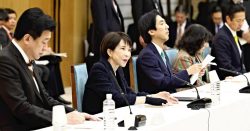Japan’s Central Government Wary of Using Generative AI for Legislative Answers

Artificial Intelligence words are seen in this illustration taken March 31, 2023.
1:00 JST, July 12, 2023
Generative artificial intelligence is being considered for answering Diet questions by only two of Japan’s ministries and agencies, according to Yomiuri Shimbun interviews conducted last month.
Economy minister Yasutoshi Nishimura had brought up the idea in April, but most of the entities answering the written interview questions said they were not considering it because of many errors in AI-generated text.
The expectation for generative AI models is for the technology to reduce the burden on bureaucrats who actually prepare the answers. At the moment, municipalities seem to be making more use of generative AI than the national government.
An expert points out that as question and answer sessions in legislatures are fundamental elements of a democracy, the use of AI should proceed with caution.
Practical challenges
Nishimura told reporters on April 11 that generative AI should be considered as a way to reduce the workload of bureaucrats.
The Yomiuri Shimbun sent questionnaires in June to 26 ministries and agencies about their intentions to introduce generative AI and found that only Nishimura’s Economy, Trade and Industry Ministry and the newly launched Children and Families Agency were considering it.
The economy ministry has long been positive about using AI, having commissioned a tech company in fiscal 2016 to study the applicability of AI for Diet answers.
“We won’t just leave all the answering of questions to AI,” said a person in charge of AI-related aspects at the ministry. The person said the technology would play auxiliary roles such as drafting answers or information gathering. “We are closely examining challenges for practical application.”
Th Cabinet Office and the Land, Infrastructure, Transport and Tourism Ministry were among the 21 entities that said they were not considering implementing AI due to the issue of errors found in information generated by AI and worries over how the AI model learns and the risk of leaking highly confidential information. Other respondents said they would wait and see what the other government entities do.
Prof. Masaki Taniguchi, who teaches Japanese politics at the University of Tokyo, said that the process of deliberating diverse opinions was important in a parliamentary democracy.
“Simply delegating answers or questions to AI will neglect the deliberative process and will call into question the very reason the legislative and executive branches of government exist,” Taniguchi said. “Politicians and administrative officials must not forget that AI is merely a tool, and that the legislature is a forum for discussion based on a person’s own insights.”
Overworked bureaucrats
Young bureaucrats are generally in charge of making the answers to Diet questions. According to a Cabinet Bureau of Personnel Affairs survey, it takes an average of seven hours to prepare the answers, often until the wee hours of the day the answers will be given.
According to the National Personnel Authority, the number of national civil servants who quit less than 10 years after joining a ministry or agency is trending up, with 109 in fiscal 2020, 40% higher than the figure in fiscal 2013. Long working hours preparing for Diet sessions are believed to be a cause.
“Consistency with past answers is important when preparing texts, and we have to manually check them using a database of Diet records, for example,” said a male bureaucrat in the economy ministry. “With AI, we can quickly check and draft sentences, and that will reduce our burden,” but he added, “If it is unclear what the generated content is based on, confirmation is extremely difficult.”
“Even if we are cautious now,” said a senior Cabinet Office official said, I think the time will come when AI will be used as a matter of course in our work, including in Diet answers.”
A Foreign Ministry bureaucrat was negative about using generative AI.
“Diet answers are composed of a large number of decisions, taking into account future directions. In that sense, because AI learns from past data to produce answers, doesn’t that make it unsuitable for making answers in the first place?”
Ritsumeikan Asia Pacific University Associate Prof. Eiji Kano, who was an economy ministry bureaucrat, said: “Reforming the way bureaucrats work is an urgent issue, and the introduction of AI will help improve work efficiency. The issues surrounding the compilations of Diet answers stem from lawmakers being slow at providing their questions to bureaucrats, which can be improved before relying on AI.”
Municipal trials
Several local governments are moving ahead in discussing the introduction of generative AI.
The Fujioka city government in Gunma Prefecture has decided to use generative AI to prepare answers at its assembly.
“We deemed it highly beneficial for gathering policy ideas and composing texts,” an official in charge said.
At the city assemblies of Isesaki, Gunma Prefecture, and Numazu, Shizuoka Prefecture, and the prefectural assembly of Kanagawa, trial question and answer sessions using generative AI were conducted in June.
For Kanagawa Prefecture, members from the Liberal Democratic Party and Gov. Yuji Kuroiwa exchanged questions and answers generated by conversational AI model ChatGPT. They discussed the advantages and challenges of using AI for prefectural administration.
Kuroiwa’s impression was that AI could be “well used as a springboard.”
A prefectural official in charge said: “It’ll be good for general discussions like that, but it is doubtful if AI can give accurate answers to specific policy questions. At present, its use will probably be limited, such as to information gathering.”
Top Articles in Politics
-

Japan PM Takaichi’s Cabinet Resigns en Masse
-

Sanae Takaichi Elected Prime Minister of Japan; Keeps All Cabinet Appointees from Previous Term
-

Japan’s Govt to Submit Road Map for Growth Strategy in March, PM Takaichi to Announce in Upcoming Policy Speech
-

LDP Wins Historic Landslide Victory
-

LDP Wins Landslide Victory, Secures Single-party Majority; Ruling Coalition with JIP Poised to Secure Over 300 seats (UPDATE 1)
JN ACCESS RANKING
-

Producer Behind Pop Group XG Arrested for Cocaine Possession
-

Japan PM Takaichi’s Cabinet Resigns en Masse
-

Man Infected with Measles Reportedly Dined at Restaurant in Tokyo Station
-

Israeli Ambassador to Japan Speaks about Japan’s Role in the Reconstruction of Gaza
-

Videos Plagiarized, Reposted with False Subtitles Claiming ‘Ryukyu Belongs to China’; Anti-China False Information Also Posted in Japan


























